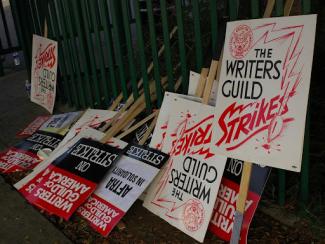
In 2007, 12,000 Hollywood writers went on strike as members of the Writers Guild of America (WGA) labor union. Writers fought to stay above water as the internet began to shift the industry.
But Black writers faced an additional struggle.
At the time, less than 10% of working television writers were “minority writers.” According to writer and producer Laurence Andries, Black writers held lower-level staff positions and were expected to be the first on the chopping block when the strike ended.
And since many Black writers worked on Black comedy shows, the end of WB and UPN meant even fewer opportunities.
In the end, writers won a stake in internet revenue. But while seasons of Everybody Hates Chris and The Wire remained intact, shows like The Game had shortened seasons. Girlfriends was canceled entirely, never to have a proper finale.
Since then, streaming has transformed film and television, leading to a 2023 WGA strike for better pay and working conditions.
And while Black writers still receive the short end of the stick, they’re risking it all to tell our stories. And they’re not alone.
From writers and educators to Amazon workers and health professionals, Black people across industries are demanding what they're worth. This fight is our history, present, and future. And when we support each other’s labor rights, we win.